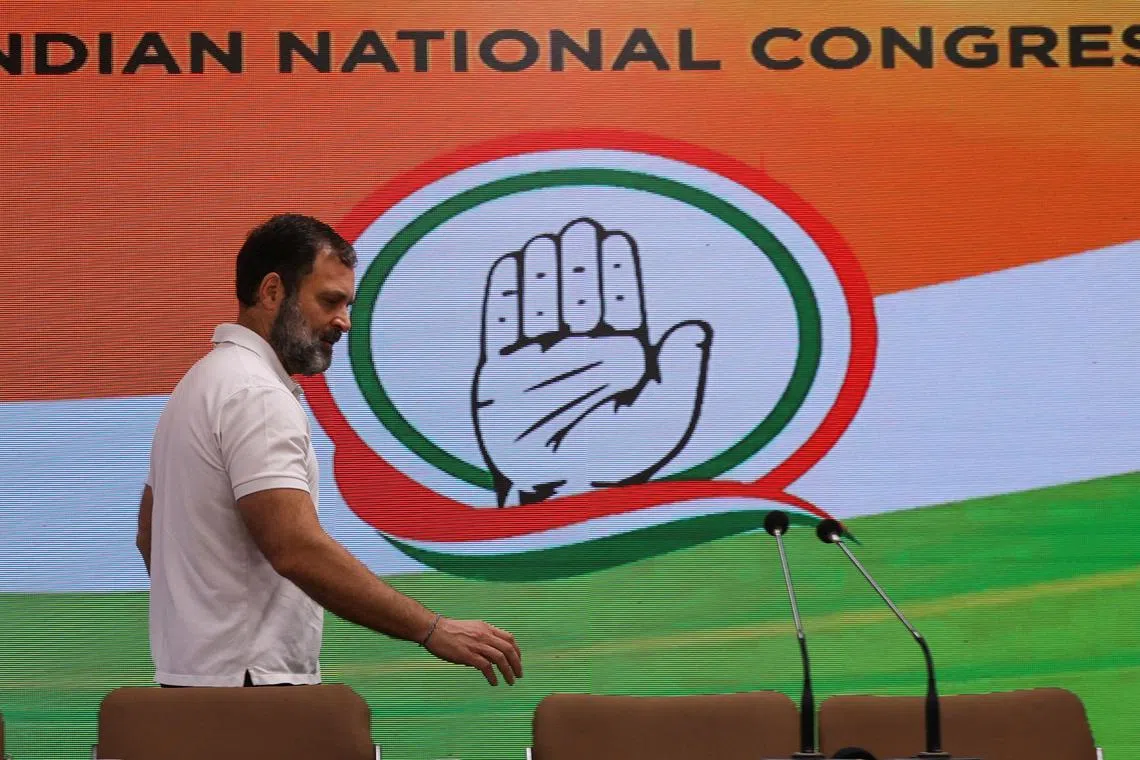Rahul Gandhi says expulsion from Indian Parliament was politically motivated
Sign up now: Get insights on Asia's fast-moving developments

Opposition leader Rahul Gandhi has been building up his own profile lately but with little success.
PHOTO: REUTERS
Follow topic:
NEW DELHI – Top Indian opposition figure Rahul Gandhi said on Saturday that his disqualification from Parliament controversial tycoon Gautam Adani.
“Please understand why I have been disqualified,” he told reporters. “I have been disqualified because the Prime Minister... is scared of the next speech that is going to come on Adani.”
“I will continue to ask the question: What is the Prime Minister’s relationship with Mr Adani?” said Mr Gandhi.
Mr Modi’s allies succeeded in having Mr Gandhi disqualified from his seat in Parliament on Friday, just a day after a court found him guilty of criminal defamation
The move came before he had any chance to appeal.
The sentence in that trial, two years in prison, happens to be the statutory minimum penalty that renders a sitting Member of Parliament ineligible for office.
Mr Gandhi, 52, said he would keep on fighting.
“I will do whatever I have to do to defend the democratic nature of this country,” he told reporters.
“They are used to everybody being scared of them,” he said, in reference to the ruling party. “I am not scared of them.”
The removal from Parliament of Mr Modi’s chief opponent comes at a time when the Prime Minister’s relationship with Mr Adani, one of India’s most powerful industrialists, has been under scrutiny.
Mr Modi has been a close associate of Mr Adani for decades, but the latter’s business empire has been the subject of renewed attention in 2023 after a US investment firm accused it of “brazen” corporate fraud.
Mr Gandhi’s opposition Indian National Congress has for weeks demanded a proper investigation by Parliament of the allegations.
Congress supporters held small rallies in several cities around the country on Saturday to protest against Mr Gandhi’s removal as a lawmaker.
Boldest stroke
New national elections are scheduled to take place early in 2024, and whatever luck Mr Gandhi and his lawyers find in court, the defamation verdict seems likely to keep him and the Congress party mired in legal defence for years to come.
Mr Gandhi’s disqualification was the boldest stroke yet by Mr Modi’s allies to winnow out potential rivals and move against sources of dissent, in what is being seen broadly as a consolidation of power before the 2024 elections.
The case stemmed from a remark made during the 2019 election campaign in which Mr Gandhi asked why “all thieves have Modi as (their) common surname”.
His comments were seen as a slur against the Prime Minister, who went on to win a landslide general election victory.
Members of the government also said that the remark was a smear against all those sharing the Modi surname, which is associated with the lower rungs of India’s traditional caste hierarchy.
Mr Gandhi has been building up his own profile lately. He rallied the public with a grassroots march across India – 4,000km over five months – in which he railed against Mr Modi’s power.
“Every democratic institution was shut for us by the government: Parliament, media, elections,” Mr Gandhi told supporters in Madhya Pradesh state in November.
“There was no other way but to hit the streets to listen and connect with people.”
But even before his conviction, political analysts did not see that Congress or any other party stood a realistic chance of displacing Mr Modi and his Bharatiya Janata Party (BJP) in the 2024 elections.
BJP campaigns remain incontestably well managed at the local, state and national levels, and changes in election financing rules under consecutive BJP governments have even further bent the electoral odds the party’s way.
Still, legal action has been widely deployed against opposition party figures and institutions seen as critical of the Modi government in recent years.
Mr Gandhi faces several other defamation cases and a money laundering case that has been snaking its way through India’s glacial legal system for more than a decade.
The Indian tax authorities in February raided the BBC’s local offices, weeks after the broadcaster aired a documentary on Mr Modi’s conduct during deadly sectarian riots decades ago.
The Editors Guild of India said then that the raids were part of a wider “trend of using government agencies to intimidate or harass press organisations that are critical of government policies”.
Congress spokesman Abhishek Manu Singhvi told reporters on Friday that the verdict against Mr Gandhi represented the “emasculation of democratic institutions by the ruling party”. REUTERS, NYTIMES

